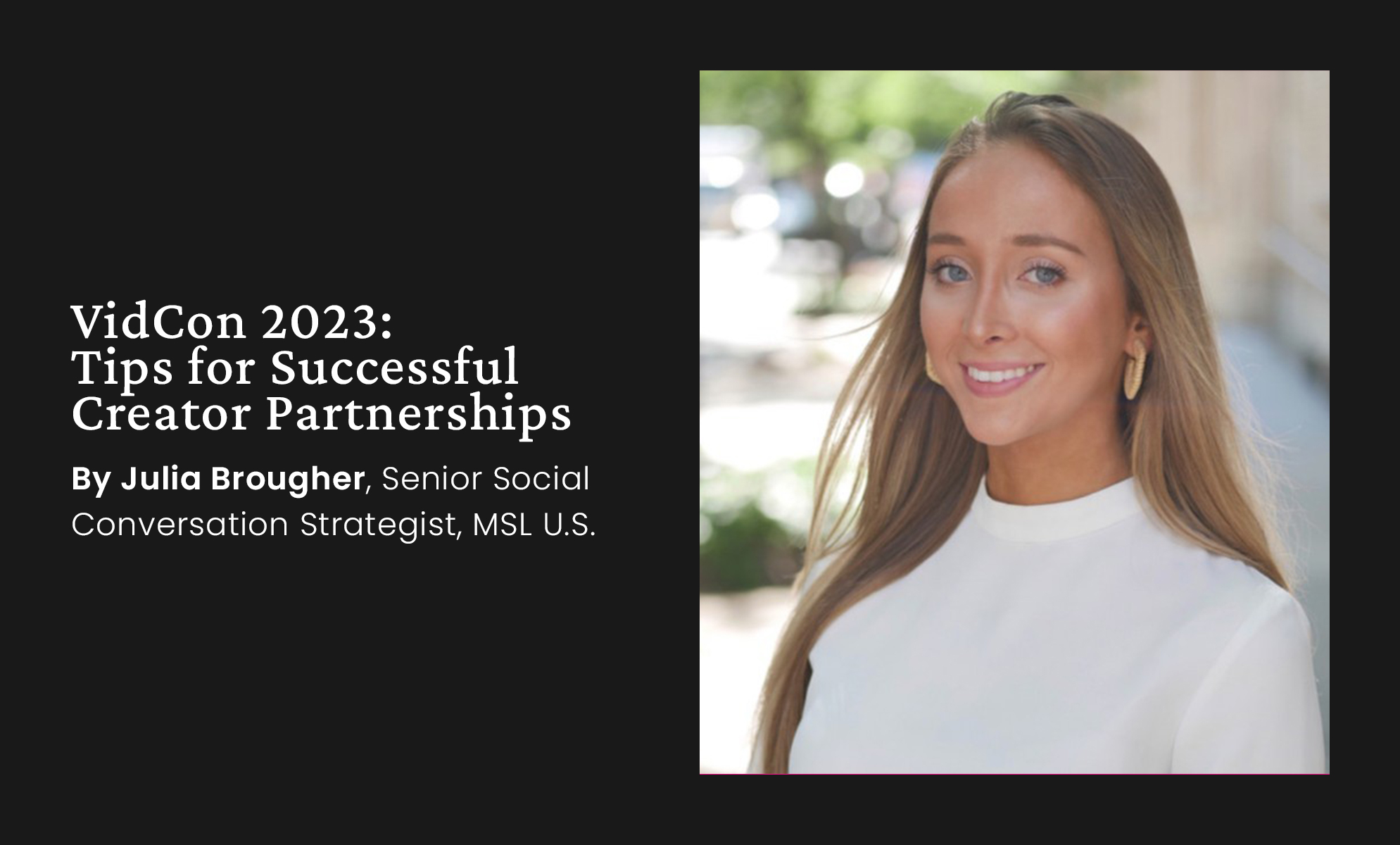Last week, MSL U.S.’ chief digital innovation officer Rob Davis and I attended VidCon 2023 in Baltimore, Maryland, where leading digital creators, platform innovators, industry leaders and fans converged in one place. The days were filled with impactful panel discussions and presentations (including two great sessions with MSL’s very own Rob Davis), where we got to hear first-hand about emerging trends in the industry and best practices when collaborating with creators. Below are some key takeaways from the convention.
What are the top tips to consider when partnering with creators?
- Add Value to Their Community: Prior to influencer outreach, we need to ensure our brand/product will benefit and resonate with the creator’s audience. Targeting the right community, is far more valuable than simply prioritizing a high follower count. In turn, these smart partnerships increase purchase intent and engagement.
- Trust Influencers: The core of any good relationship is trust – that goes for influencer relationships too. Influencers know their audience better than anyone, so always trust they know what their community wants to see. If they don’t feel confident your outlined idea and/or messaging will align with their followers, listen to them and pivot accordingly.
- Give Guidelines, Not Scripts: Always remember, these are influencers – not trained actors. You are partnering with an influencer because of their personality, use that to your advantage. Influencers need room for creative control, so brands should only provide guidelines and give room to let influencers work their magic.
- Have an Organic-First Mindset: No one wants to feel like they’re being pitched at. Collaborate with influencers to create content that aligns with their owned organic content. This will reduce the feel of a generic advertisement and keep their audience engaged.
- Consider Long-Term Partnerships: Establishing an ongoing content series creates a mutually beneficial relationship between creators and our brands (more on that below).
Why should brands prioritize long-term influencer partnerships?
- Authenticity & Trust: Long-term partnerships can lead to deeper relationships between influencers, their followers and our brands. As influencers consistently promote a brand over time, their endorsement can be perceived as more authentic and trustworthy compared to one-off promotions.
- Strong Brand Messaging: Previous partners are already familiar with a brand's values, messaging and product benefits. This enables creators to accurately represent the brand in new engaging ways, while limiting the risk of reshoots and edits.
- Audience Loyalty: When influencers consistently promote a brand or product they genuinely believe in, their followers are more likely to trust their recommendations and develop loyalty to the brand. This can lead to higher customer retention rates.
- Extension of the Marketing Team: Long-term partners are more likely to be invested in the success of a brand, and in turn can become a consultant to help optimize. Creators can offer constructive feedback, collaborate on campaigns and pitch new ideas. Remember, influencers are small business owners AND consumers – their opinions matter. We should learn from their audience-building experiences and put that back that into our own social strategies.
- Measure Success: Ongoing partnerships give brands more visibility to see the ROI of a campaign, while one-off partnerships make it more difficult to measure direct impact to sales.
What do consumers want from influencers?
- Trust & Transparency: Consumers are looking for real people, with real stories who aren’t just hiding behind brand names. They want creators to be genuine and transparent with their content, opinions and recommendations.
- Human First: Consumers prefer influencers who are relatable and represent a diverse range of backgrounds, lifestyles and experiences. While consumers enjoy following influencers who are “aspirational”, they still want to be able to relate and share common experiences.
- “Edu-Taining” Content: Whether consumers consciously know it or not, they enjoy learning new things. Consumers want to see content that prioritizes making learning engaging, enjoyable and accessible.
How should we be using AI?
- Use it as a Guide, Not a Crutch: While AI can help us work smarter, not harder – it is important to remember that human touch is still crucial for success. We are the experts who know our brands inside and out, we should never rely on AI to do our jobs for us.
- Accessibility: AI-powered language translation tools can help brands expand into new markets and communicate effectively with a global audience – at the click of a button.
- Sentiment Analysis: AI can help us analyze social media and online mentions to gauge sentiment and identify emerging trends or issues in real-time.
- Content Generation: We can use AI to assist with the creation of social captions, bios, press materials, video editing, visuals – the list goes on.
